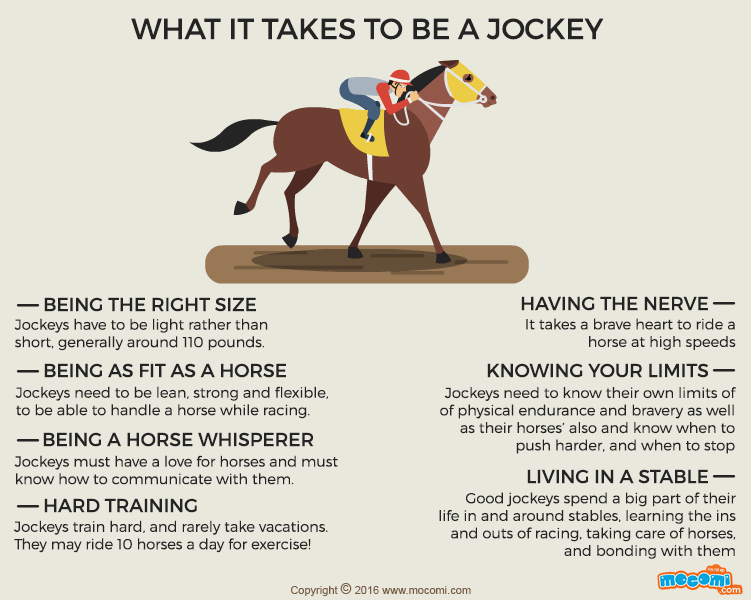“Horse races sound like fun! They’re so exciting. I’m going to be a jockey. I’m short enough for it” That is a good example of how not to be a jockey. Being the short strong person who leads a horse to victory isn’t an easy thing to do. Like with any other sport, it takes years of toiling and training to be a good jockey. Let’s see what it takes to be a Jockey
How to become a Jockey : 7 Tips
1. It’s not about being short –
That’s like saying you would need a DSLR to be a photographer. While the DSLR would definitely help one to be a photographer, it’s hardly everything of importance. Similarly, when it comes to being a Jockey, being short is an added advantage and nothing more. Jockeys are short because they are (meant to be) lighter than their taller counterparts. Most jockeys weigh less than or equal to 110 pounds. This is because horses are allowed to carry a maximum of 120 pounds into the race, and that is inclusive of the jockey and his gear.
2. Be as fit as a horse –
Horse racing isn’t child’s play, and a jockey needs to be lean, strong and flexible in order to do it. It is said that jockeys are the fittest athletes in the world. And for good reason. Jockeys need to be physically strong, as well as have the finesse to manoeuvre a horse during a race.
3. Have the nerve –
Even if you’re athletic enough, it takes a brave heart to ride a horse at high speeds. Horses are living beings, and that makes them unpredictable at times. A jockey needs to be able to maintain his cool and “hold his horses” in times of difficulty.
4. Be a horse whisperer –
It goes without saying that a jockey must have a love and appreciation for horses. And he/she should know how to communicate with one. Horses can tell when you’re scared, and can read the jockey as well as he can read them.
5. Know your limits –
No two horses are alike, and a good jockey knows that even the same horse cannot deliver the same performance every time. It’s important to know your (and your horse’s) limits of physical endurance and bravery and know when to push harder, and when to stop.
6. Live in a stable –
It might sound weird, but good jockeys spend a major part of their life in and around stables. This helps them to learn the ins and outs of racing, and also bond better with their horses.
7. Train hard, really hard-
Jockeys train mighty hard. This usually means early hours, working 7 days a week, and not too many vacations. Jockeys can ride up to 10 horses a day as exercise!
If you decide you can do all this, research thoroughly for horse farms, where you can learn to ride and care for horses. There are many schools and training centres these days as well, where you can learn to ride and race. Being a jockey isn’t about horsing around, is it? It is after all, hard work that pays – in any profession.



this guyde measns so muich to me because i am 4 and i love horses and i am not very bright because of autism but this help me hapiness thank u :DDD
by the way my name is stu pedbi itch people say it full because it sound good 🙂
yay! thank for tyhis guide it very help! i am four! i love riding my horse if u know what i mean 😉 tahnks u very much
yay! thank for tyhis guide it very help! i am four! i love riding my horse if u know what i mean 😉